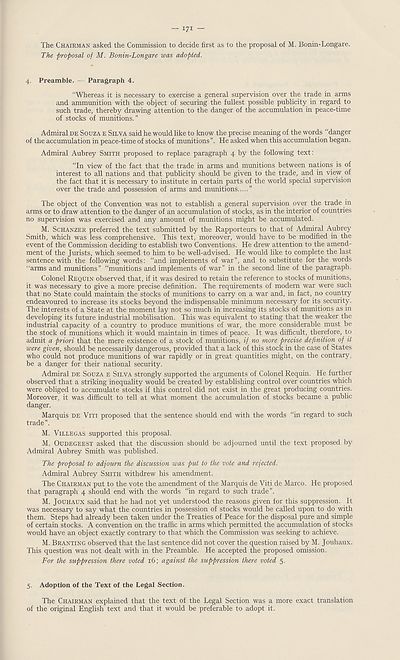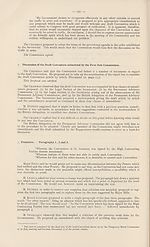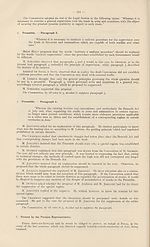Armament > Conference for the control of the international trade in arms, munitions and implements of war
(173)
Download files
Complete book:
Individual page:
Thumbnail gallery: Grid view | List view

The Chairman asked the Commission to decide first as to the proposal of M. Bonin-Longare.
The proposal of M. Bonin-Longare was adopted.
4. Preamble. — Paragraph 4.
“Whereas it is necessary to exercise a general supervision over the trade in arms
and ammunition with the object of securing the fullest possible publicity in regard to
such trade, thereby drawing attention to the danger of the accumulation in peace-time
of stocks of munitions.”
Admiral de Souza e Silva said he would like to know the precise meaning of the words “danger
of the accumulation in peace-time of stocks of munitions”. He asked when this accumulation began.
Admiral Aubrey Smith proposed to replace paragraph 4 by the following text:
“In view of the fact that the trade in arms and munitions between nations is of
interest to all nations and that publicity should be given to the trade, and in view of
the fact that it is necessary to institute in certain parts of the world special supervision
over the trade and possession of arms and munitions ”
The object of the Convention was not to establish a general supervision over the trade in
arms or to draw attention to the danger of an accumulation of stocks, as in the interior of countries
no supervision was exercised and any amount of munitions might be accumulated.
M. Schanzer preferred the text submitted by the Rapporteurs to that of Admiral Aubrey
Smith, which was less comprehensive. This text, moreover, would have to be modified in the
event of the Commission deciding to establish two Conventions. He drew attention to the amend¬
ment of the Jurists, which seemed to him to be well-advised. He would like to complete the last
sentence with the following words: “and implements of war”, and to substitute for the words
“arms and munitions” “munitions and implements of war” in the second line of the paragraph.
Colonel Requin observed that, if it was desired to retain the reference to stocks of munitions,
it was necessary to give a more precise definition. The requirements of modern war were such
that no State could maintain the stocks of munitions to carry on a war and, in fact, no country
endeavoured to increase its stocks beyond the indispensable minimum necessary for its security.
The interests of a State at the moment lay not so much in increasing its stocks of munitions as in
developing its future industrial mobilisation. This was equivalent to stating that the weaker the
industrial capacity of a country to produce munitions of war, the more considerable must be
the stock of munitions which it would maintain in times of peace. It was difficult, therefore, to
admit a priori that the mere existence of a stock of munitions, if no more precise definition of it
were given, should be necessarily dangerous, provided that a lack of this stock in the case of States
who could not produce munitions of war rapidly or in great quantities might, on the contrary,
be a danger for their national security.
Admiral de Souza e Silva strongly supported the arguments of Colonel Requin. He further
observed that a striking inequality would be created by establishing control over countries which
were obliged to accumulate stocks if this control did not exist in the great producing countries.
Moreover, it was difficult to tell at what moment the accumulation of stocks became a public
danger.
Marquis de Viti proposed that the sentence should end with the words “in regard to such
trade”.
M. Villegas supported this proposal.
M. Oudegeest asked that the discussion should be adjourned until the text proposed by
Admiral Aubrey Smith was published.
The proposal to adjourn the discussion was put to the vote and rejected.
Admiral Aubrey Smith withdrew his amendment.
The Chairman put to the vote the amendment of the Marquis de Viti de Marco. He proposed
that paragraph 4 should end with the words “in regard to such trade”.
M. Jouhaux said that he had not yet understood the reasons given for this suppression. It
was necessary to say what the countries in possession of stocks would be called upon to do with
them. Steps had already been taken under the Treaties of Peace for the disposal pure and simple
of certain stocks. A convention on the traffic in arms which permitted the accumulation of stocks
would have an object exactly contrary to that which the Commission was seeking to achieve.
M. Branting observed that the last sentence did not cover the question raised by M. Jouhaux.
This question was not dealt with in the Preamble. He accepted the proposed omission.
For the suppression there voted 16; against the suppression there voted 5-
5. Adoption of the Text of the Legal Section.
The Chairman explained that the text of the Legal Section was a more exact translation
of the original English text and that it would be preferable to adopt it.
The proposal of M. Bonin-Longare was adopted.
4. Preamble. — Paragraph 4.
“Whereas it is necessary to exercise a general supervision over the trade in arms
and ammunition with the object of securing the fullest possible publicity in regard to
such trade, thereby drawing attention to the danger of the accumulation in peace-time
of stocks of munitions.”
Admiral de Souza e Silva said he would like to know the precise meaning of the words “danger
of the accumulation in peace-time of stocks of munitions”. He asked when this accumulation began.
Admiral Aubrey Smith proposed to replace paragraph 4 by the following text:
“In view of the fact that the trade in arms and munitions between nations is of
interest to all nations and that publicity should be given to the trade, and in view of
the fact that it is necessary to institute in certain parts of the world special supervision
over the trade and possession of arms and munitions ”
The object of the Convention was not to establish a general supervision over the trade in
arms or to draw attention to the danger of an accumulation of stocks, as in the interior of countries
no supervision was exercised and any amount of munitions might be accumulated.
M. Schanzer preferred the text submitted by the Rapporteurs to that of Admiral Aubrey
Smith, which was less comprehensive. This text, moreover, would have to be modified in the
event of the Commission deciding to establish two Conventions. He drew attention to the amend¬
ment of the Jurists, which seemed to him to be well-advised. He would like to complete the last
sentence with the following words: “and implements of war”, and to substitute for the words
“arms and munitions” “munitions and implements of war” in the second line of the paragraph.
Colonel Requin observed that, if it was desired to retain the reference to stocks of munitions,
it was necessary to give a more precise definition. The requirements of modern war were such
that no State could maintain the stocks of munitions to carry on a war and, in fact, no country
endeavoured to increase its stocks beyond the indispensable minimum necessary for its security.
The interests of a State at the moment lay not so much in increasing its stocks of munitions as in
developing its future industrial mobilisation. This was equivalent to stating that the weaker the
industrial capacity of a country to produce munitions of war, the more considerable must be
the stock of munitions which it would maintain in times of peace. It was difficult, therefore, to
admit a priori that the mere existence of a stock of munitions, if no more precise definition of it
were given, should be necessarily dangerous, provided that a lack of this stock in the case of States
who could not produce munitions of war rapidly or in great quantities might, on the contrary,
be a danger for their national security.
Admiral de Souza e Silva strongly supported the arguments of Colonel Requin. He further
observed that a striking inequality would be created by establishing control over countries which
were obliged to accumulate stocks if this control did not exist in the great producing countries.
Moreover, it was difficult to tell at what moment the accumulation of stocks became a public
danger.
Marquis de Viti proposed that the sentence should end with the words “in regard to such
trade”.
M. Villegas supported this proposal.
M. Oudegeest asked that the discussion should be adjourned until the text proposed by
Admiral Aubrey Smith was published.
The proposal to adjourn the discussion was put to the vote and rejected.
Admiral Aubrey Smith withdrew his amendment.
The Chairman put to the vote the amendment of the Marquis de Viti de Marco. He proposed
that paragraph 4 should end with the words “in regard to such trade”.
M. Jouhaux said that he had not yet understood the reasons given for this suppression. It
was necessary to say what the countries in possession of stocks would be called upon to do with
them. Steps had already been taken under the Treaties of Peace for the disposal pure and simple
of certain stocks. A convention on the traffic in arms which permitted the accumulation of stocks
would have an object exactly contrary to that which the Commission was seeking to achieve.
M. Branting observed that the last sentence did not cover the question raised by M. Jouhaux.
This question was not dealt with in the Preamble. He accepted the proposed omission.
For the suppression there voted 16; against the suppression there voted 5-
5. Adoption of the Text of the Legal Section.
The Chairman explained that the text of the Legal Section was a more exact translation
of the original English text and that it would be preferable to adopt it.
Set display mode to:
![]() Universal Viewer |
Universal Viewer | ![]() Mirador |
Large image | Transcription
Mirador |
Large image | Transcription
Images and transcriptions on this page, including medium image downloads, may be used under the Creative Commons Attribution 4.0 International Licence unless otherwise stated. ![]()
| League of Nations > Armament > Conference for the control of the international trade in arms, munitions and implements of war > (173) |
|---|
| Permanent URL | https://digital.nls.uk/195384012 |
|---|
| Shelfmark | LN.IX |
|---|
| Description | Over 1,200 documents from the non-political organs of the League of Nations that dealt with health, disarmament, economic and financial matters for the duration of the League (1919-1945). Also online are statistical bulletins, essential facts, and an overview of the League by the first Secretary General, Sir Eric Drummond. These items are part of the Official Publications collection at the National Library of Scotland. |
|---|---|
| Additional NLS resources: |
|

